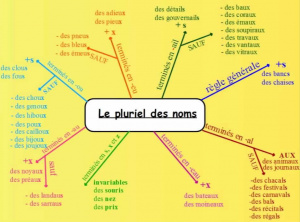Difference between revisions of "Language/French/Grammar/Number-differences-between-French-and-English-nouns"
Jump to navigation
Jump to search
| Line 1: | Line 1: | ||
[[File:le-pluriel-des-noms-Learn-french-PolyglotClub2.jpg|thumb]] | [[File:le-pluriel-des-noms-Learn-french-PolyglotClub2.jpg|thumb]] | ||
[[File:French-Language-PolyglotClub.png|thumb]] | [[File:French-Language-PolyglotClub.png|thumb]] | ||
<div style="font-size:300%"> French Grammar - Number differences between French and English nouns</div> | <div style="font-size:300%">French Grammar - Number differences between French and English nouns</div> | ||
Some nouns which are singular in English are plural in French, and others are plural in English and singular in French. The following are examples which sometimes cause difficulty for English speakers: | Some nouns which are singular in English are plural in French, and others are plural in English and singular in French. The following are examples which sometimes cause difficulty for English speakers: | ||
Revision as of 20:44, 26 November 2021
French Grammar - Number differences between French and English nouns
Some nouns which are singular in English are plural in French, and others are plural in English and singular in French. The following are examples which sometimes cause difficulty for English speakers:
| English singular | French plural |
|---|---|
| applause | les applaudissements |
| darkness | les ténèbres |
| sb's funeral | les funérailles de qn |
| hair | les cheveux |
| information | des informations, des renseignements |
| knowledge | les connaissances |
| to make progress | faire des progrès |
| to do research/my research | faire des recherches/mes recherches |
| English plural | French singular |
| economics | l'économie |
| grapes (grape = un grain de raisin) | du raisin |
| linguistics | la linguistique |
| physics | la physique |
| pyjamas | un pyjama |
| shorts | un short |
| stairs | l'escalier |
| tights | un collant |
| trousers | un pantalon |
| underpants | un slip |
- NB: Some mass nouns in French can also be used as count nouns more freely than their English equivalents:
| French | English |
|---|---|
| un fruit | a piece of fruit |
| un pain | a loaf of bread (NOT *a bread) |
| un raisin | a type of grape |

